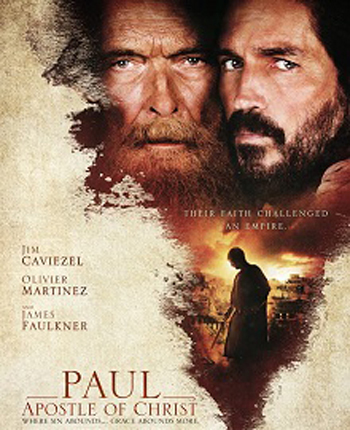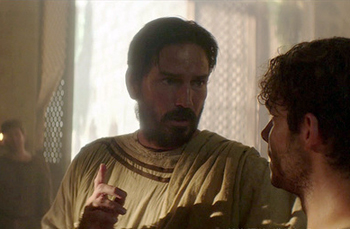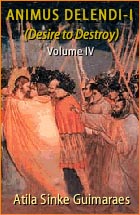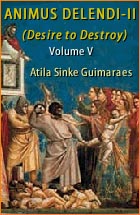Movie Review
 |
 |
 |
 |
 |
 |
 |
The Blood of Martyrs Is the Seed of Christians
Fr. Paul Alvarez
The film is based on the Acts of the Apostles, which Catholic Tradition has always accepted as canonical and has always attributed to St. Luke. Only some heretical sects, such as the Ebionites, Marcionitas and Manichaeans, denied the authenticity of this book. Thus they rejected St. Paul’s teaching in its whole or parts.
 The Apostolic Fathers spoke of the Acts as a part of Sacred Scripture and, at the end of the 2nd century, St. Irenaeus, Tertullian, Clement of Alexandria, Origen and the canon of Muratori formally named St. Luke as its author. All subsequent Fathers and long-established ecclesiastical writers concur with this tradition confirmed by the Church’s official documents. (1)
The Apostolic Fathers spoke of the Acts as a part of Sacred Scripture and, at the end of the 2nd century, St. Irenaeus, Tertullian, Clement of Alexandria, Origen and the canon of Muratori formally named St. Luke as its author. All subsequent Fathers and long-established ecclesiastical writers concur with this tradition confirmed by the Church’s official documents. (1)
We have the certainty that the book of Acts was written before the year 64 and before St. Paul was released from prison, that is, around the year 63, because there the narration is interrupted. In this case, St. Luke would have written it without a doubt in Rome.
The film portrays the story of Luke's writing of the life of St. Paul.
What about the film’s director?
Andrew Hyatt, writer-director of Paul, Apostle of Christ, is also responsible for Full of Grace, a complete "disgrace" in the eyes of any Catholic with a minimal knowledge of his Faith. Not counting the fact that it boldly undermines the image of Our Lady, it radically departs from common Catholic teaching that she was preserved free from any stain of original sin and of its subsequent effects. It also omits her Assumption into Heaven, forgetting the beautiful tradition of the first centuries of Christianity in which her transit is narrated (for example in the Shepherd of Hermas).
 But these are not the only problems: The lack of any notion of the supernatural or the action of grace pervades Full of Grace. This idea in a certain way is a fruit of Historicism, a school that, by the linguistic form of the texts, tries to determine the degree of reliability that should be granted to the Sacred Scripture.
But these are not the only problems: The lack of any notion of the supernatural or the action of grace pervades Full of Grace. This idea in a certain way is a fruit of Historicism, a school that, by the linguistic form of the texts, tries to determine the degree of reliability that should be granted to the Sacred Scripture.
Notwithstanding this historic method being condemned, it is guiding the majority of modern literary works and audiovisual productions. This is a premise to take into consideration in watching this film, or any other movie production with a biblical theme.
A pacifist tonus
With this in mind, we can turn to Hyatt's latest film: Paul, Apostle of Christ, which aims to show the life of the first Christians. In it there are both lights and shadows, one of which is the division it draws between “the pacifists” and “the militants,” making, of course, the militant and fiery St. Paul and St. Luke pacifists.
 For example, in one scene an impassioned St. Luke (Jim Caviezel) indignantly raises his voice while telling St. Paul (James Faulkner) about the sufferings inflicted on Christians. St. Paul responds with this forceful answer: “Love is the only way.” This phrase becomes the leitmotiv of the movie.
For example, in one scene an impassioned St. Luke (Jim Caviezel) indignantly raises his voice while telling St. Paul (James Faulkner) about the sufferings inflicted on Christians. St. Paul responds with this forceful answer: “Love is the only way.” This phrase becomes the leitmotiv of the movie.
What is not said here is that this line from St. Paul's famous Hymn to Charity is taken out of context. We just need to read the Letter to the Corinthians to understand why I am saying this.
In it (1 Cor 13) St. Paul was giving a concrete response to certain tendencies that arose among some members of that community who were developing an unhealthy desire for spiritual gifts. St. Paul corrects and exhorts them, insisting on three essential points:
A moving portrayal of martyrdom
In its favor, this film is an effort to show the reality of the martyrdom suffered by our ancestors in the Faith, our true Elder Brothers. Without a doubt it would not please the Jews, today wrongly called our “elder brothers.” St. Paul is not exactly a friend of theirs. In fact, the Jews have a particular aversion to this Saint and there are testimonies that some teach that the “apostate” Saul “invented” Christianity.
In any case, the exposition of the first Christians' persecution drama is the most positive aspect of the film, offering a beautiful tribute to the persecuted Christians of all times. In a striking and praiseworthy way it depicts the martyrdom of those who were used as human torches to light the streets of Rome and of so many others who were thrown to the lions because of their faith in Christ.
Another point to note is the reference made to the grace of conversion received by those who sincerely seek God. St. Paul, once the murderer of Christians, by the grace of God and through the miraculous intervention of Our Lord on his trip to Damascus, becomes one of the most solid pillars of the Church, one of her most seasoned missionaries, and perhaps the greatest expositor of the Faith Christ has given us.
 About the Jews, St. Paul said: “For as many as are of the works of the law, are under a curse” (2) We can understand, then, why today this great Saint has been the target of all kinds of attacks. There are even those who claim that St. Paul inter-mixed the life of Jesus with Greek philosophy to reinterpret the Hebrew Bible in terms of the platonic opposition between the ideal and the material. (3)
About the Jews, St. Paul said: “For as many as are of the works of the law, are under a curse” (2) We can understand, then, why today this great Saint has been the target of all kinds of attacks. There are even those who claim that St. Paul inter-mixed the life of Jesus with Greek philosophy to reinterpret the Hebrew Bible in terms of the platonic opposition between the ideal and the material. (3)
Friedrich Nietzsche said that St. Paul “falsified the history of Israel so to make it appear as a prologue to his mission” and was “a genius in hatred, in the standpoint of hatred, and in the relentless logic of hatred.” (4) Almost all the historiography of Judaism perceived Paul as a “traitor” to the people of Israel. (5)
Finally, it is noteworthy that, according to the director himself, “the Scriptures have been the only material for writing the script.” This is easily confirmed throughout the film and, although certain parts lack contextual coherence, the fact of using the biblical text as a parameter provides a certain protection against the many misleading interpretations or malicious falsifications that Hollywood normally makes.
Speaking of Hollywood, the critics of this film employ a foul, superficial and clearly anti-Christian language. There are attacks of all kinds against it, even by those who do not know about the history, much less the Faith, that motivated Christians to live and act as they did.
One censor even said that the film is “a penance for Holy Week” because “ there is no emotion or action.” He is referring, of course, to the fact that in the movie there is no immoral scenes. This is another point in its favor. Actually these vicious critiques paradoxically make me recommend the film to faithful Catholics, since, as the Spanish saying goes, “You are known by whom your enemy is; tell me who hates you and I will tell you who you are.”
The visual effects are quite good, as well as the setting and the choice of Jim Caviezel as Luke. In passing let me say that the French accent of Olivier Martinez is not, in my opinion, exactly the most suitable for a Roman prefect.
Even without an exorbitant budget the film achieves its objective. I recommend it because it presents the suffering of the Christians as a testimony of their faith in Christ, and St. Paul as a convincing spiritual leader and faithful Apostle of Christ.


We have the certainty that the book of Acts was written before the year 64 and before St. Paul was released from prison, that is, around the year 63, because there the narration is interrupted. In this case, St. Luke would have written it without a doubt in Rome.
The film portrays the story of Luke's writing of the life of St. Paul.
What about the film’s director?
Andrew Hyatt, writer-director of Paul, Apostle of Christ, is also responsible for Full of Grace, a complete "disgrace" in the eyes of any Catholic with a minimal knowledge of his Faith. Not counting the fact that it boldly undermines the image of Our Lady, it radically departs from common Catholic teaching that she was preserved free from any stain of original sin and of its subsequent effects. It also omits her Assumption into Heaven, forgetting the beautiful tradition of the first centuries of Christianity in which her transit is narrated (for example in the Shepherd of Hermas).

Director Wyatt, left, made a disgraceful naturalist portrayal of Our Lady in Full of Grace
Notwithstanding this historic method being condemned, it is guiding the majority of modern literary works and audiovisual productions. This is a premise to take into consideration in watching this film, or any other movie production with a biblical theme.
A pacifist tonus
With this in mind, we can turn to Hyatt's latest film: Paul, Apostle of Christ, which aims to show the life of the first Christians. In it there are both lights and shadows, one of which is the division it draws between “the pacifists” and “the militants,” making, of course, the militant and fiery St. Paul and St. Luke pacifists.

Luke repeating the film's leitmotiv ‘Love is the only way’ to an angry early Christian
What is not said here is that this line from St. Paul's famous Hymn to Charity is taken out of context. We just need to read the Letter to the Corinthians to understand why I am saying this.
In it (1 Cor 13) St. Paul was giving a concrete response to certain tendencies that arose among some members of that community who were developing an unhealthy desire for spiritual gifts. St. Paul corrects and exhorts them, insisting on three essential points:
- The excellence of Charity, which is superior to any spiritual gift. Without it, spiritual gifts are worthless;
- Charity must be translated into concrete behavior;
- Its perennial character: All other spiritual gifts are temporary but the love of God is eternal because God himself is the source and object of that love.
A moving portrayal of martyrdom
In its favor, this film is an effort to show the reality of the martyrdom suffered by our ancestors in the Faith, our true Elder Brothers. Without a doubt it would not please the Jews, today wrongly called our “elder brothers.” St. Paul is not exactly a friend of theirs. In fact, the Jews have a particular aversion to this Saint and there are testimonies that some teach that the “apostate” Saul “invented” Christianity.
In any case, the exposition of the first Christians' persecution drama is the most positive aspect of the film, offering a beautiful tribute to the persecuted Christians of all times. In a striking and praiseworthy way it depicts the martyrdom of those who were used as human torches to light the streets of Rome and of so many others who were thrown to the lions because of their faith in Christ.
Another point to note is the reference made to the grace of conversion received by those who sincerely seek God. St. Paul, once the murderer of Christians, by the grace of God and through the miraculous intervention of Our Lord on his trip to Damascus, becomes one of the most solid pillars of the Church, one of her most seasoned missionaries, and perhaps the greatest expositor of the Faith Christ has given us.

The film portrays Roman soldiers throwing oil on Christians to make ‘human torches’
Friedrich Nietzsche said that St. Paul “falsified the history of Israel so to make it appear as a prologue to his mission” and was “a genius in hatred, in the standpoint of hatred, and in the relentless logic of hatred.” (4) Almost all the historiography of Judaism perceived Paul as a “traitor” to the people of Israel. (5)
Finally, it is noteworthy that, according to the director himself, “the Scriptures have been the only material for writing the script.” This is easily confirmed throughout the film and, although certain parts lack contextual coherence, the fact of using the biblical text as a parameter provides a certain protection against the many misleading interpretations or malicious falsifications that Hollywood normally makes.
Speaking of Hollywood, the critics of this film employ a foul, superficial and clearly anti-Christian language. There are attacks of all kinds against it, even by those who do not know about the history, much less the Faith, that motivated Christians to live and act as they did.
One censor even said that the film is “a penance for Holy Week” because “ there is no emotion or action.” He is referring, of course, to the fact that in the movie there is no immoral scenes. This is another point in its favor. Actually these vicious critiques paradoxically make me recommend the film to faithful Catholics, since, as the Spanish saying goes, “You are known by whom your enemy is; tell me who hates you and I will tell you who you are.”
The visual effects are quite good, as well as the setting and the choice of Jim Caviezel as Luke. In passing let me say that the French accent of Olivier Martinez is not, in my opinion, exactly the most suitable for a Roman prefect.
Even without an exorbitant budget the film achieves its objective. I recommend it because it presents the suffering of the Christians as a testimony of their faith in Christ, and St. Paul as a convincing spiritual leader and faithful Apostle of Christ.
- Decree of the Pontifical Biblical Commission, Dz 2166-2171.
- Gal 3:10.
- Daniel Boyarin, A Radical Jew: Paul and the Politics of Identity, LA: Un of Cal. Press: 1994, pp. 60-62.
- Judith Shulevitz, "Was Paul a Jew?" Tablet Book Reviews online, November 11, 2009.
- Apud, Mario Javier Sabán, Causas y consecuencias de la ruptura entre el judaísmo y el cristianismo en el siglo II, Doctoral thesis, Departament d’Història Facultat de Lletres Universitat de Lleida, 2016, p. 58.

Posted April 2, 2018
______________________
______________________
 Volume I |
 Volume II |
 Volume III |
 Volume IV |
 Volume V |
 Volume VI |
 Volume VII |
 Volume VIII |
 Volume IX |
 Volume X |
 Volume XI |
 Special Edition |


